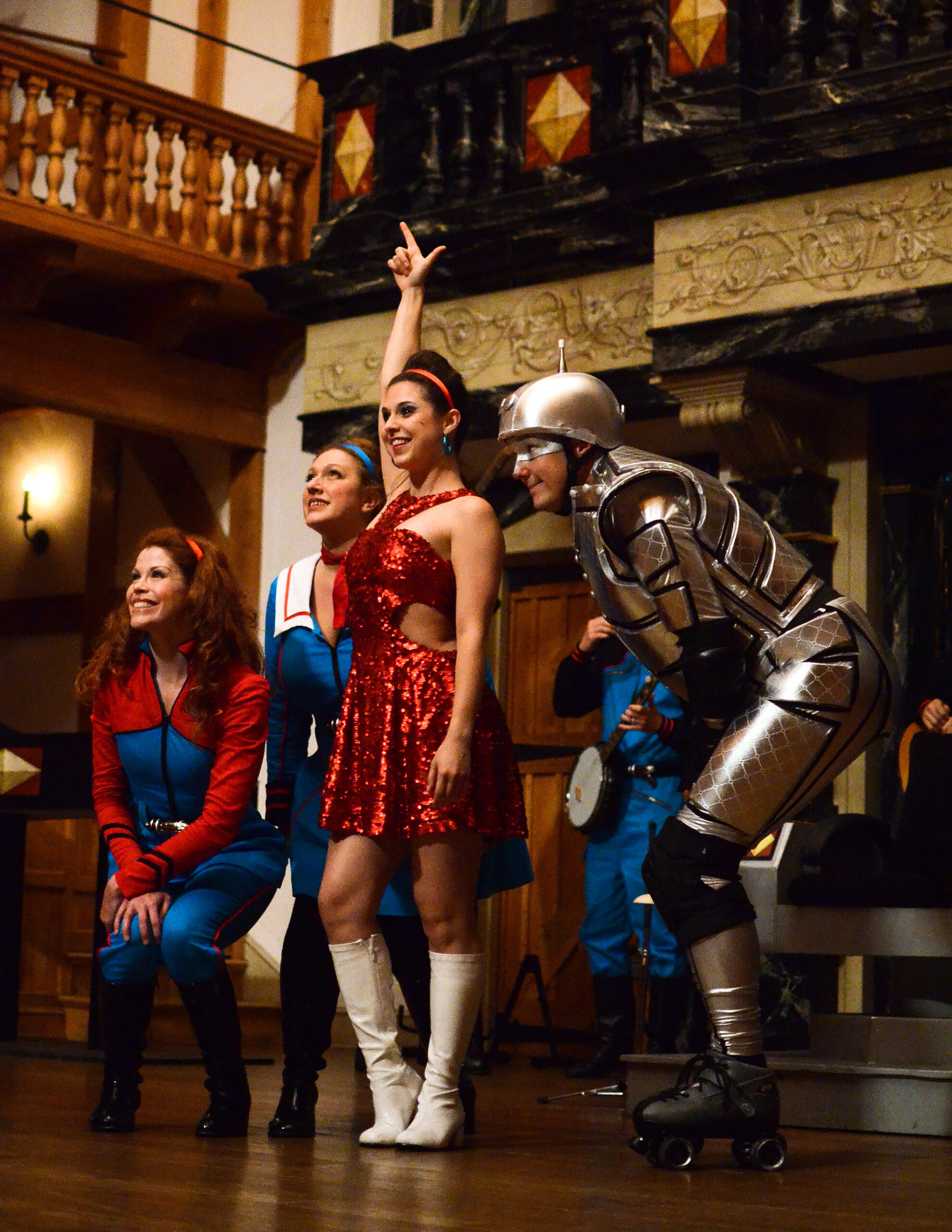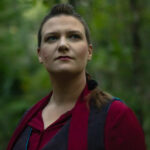by Monica Cross

There is a pervasive sentiment that science fiction and fantasy “don’t work” on stage. So let’s put that to the test. Take Mary Shelley’s Frankenstein, for example, since it is commonly put forth as the beginning of the science fiction genre. Within five years of its initial publication, Frankenstein had been adapted for the stage. By that metric, science fiction has been on the stage almost as long as science fiction has been around. As for fantasy, we see elements of the fantastical entwined much further back. So while we can debate whether the appearance of literal gods in the Greek plays or mischief-making fairies in Shakespeare’s writing constitutes fantasy or if it was simply a reflection of their world view at the time they were written, I would argue that the modern productions of The Bacchae by Euripides or A Midsummer Night’s Dream must be viewed as productions of fantasy today.
The fact that certain types of SFF theater get staged while others are rarely seen comes down to those who make the choices about what sorts of plays to produce. It is producers, theaters, and season selection committees that make those decisions, and it is my experience that many feel like they cannot or should not program SFF plays in their theaters.
I must add here that I am not talking about all producers. There is a growing number of theaters and producers who not only program SFF plays but go so far as to champion them. Still, the reservations I am discussing here seem prevalent across the industry, and to this day I field questions from industry professionals about the viability of SFF theater.
Common Assumptions About SFF Theater
The primary assumption that producers seem to make is that there isn’t an audience for SFF plays. They assume (and they may or may not be right, depending on their particular audience demographic) that SFF plays won’t sell tickets. This may stem from assumptions about the literary nature of theater versus the pulp nature of genre fiction, which I believe is a false dichotomy, as seen by the popularity of musicals such as Wicked or Into the Woods. I once worked at a Shakespeare company that staged a wildly popular production of The Return to the Forbidden Planet, a sci-fi musical parody that combines the 1956 film Forbidden Planet with its Shakespearean inspiration The Tempest. The fact that the top three examples that come to mind are musicals may be worth noting, but that may also be that (in my experience) musicals attract a wider audience than non-musical plays. The point is that I have seen audiences show up for SFF plays in ways that challenge this assumption about genre plays.

The other major assumption producers make is that SFF plays are too difficult to stage. And certainly there are elements common to science fiction and fantasy that would be difficult to put on stage. However, those who universally write off SFF theater as unstageable are generally overlooking several key details.
Several Realities of SFF Theater
To start, it is important to realize that certain types of SFF stories rely less on effects than others. While I love seeing high-concept, high SFF plays on stage (and I’ve perhaps seen more than most because I seek them out at every opportunity), the unfortunate reality is that plays taking place in the near future or sprinkling fabulist elements through an otherwise naturalistic plot are in fact seen as being easier to stage and have more of an audience. These plays often have the side effect of not even registering to audiences (or perhaps even the theaters producing them) as science fiction or fantasy.
Branching out beyond SFF that does not require effects are plays that work within established theatrical conventions. On stage, there are often ways to convey SFF elements without special effects. My go-to example of this is Oberon in A Midsummer Night’s Dream. The lovers run on stage and Oberon says, “But who comes here? I am invisible; / And I will overhear their conference.” (AMND 2.1) He can accompany this with a gesture or a swish of a cloak, but that is wholly unnecessary. By simply saying that he is invisible and having the other characters walk right past him, we know he is invisible. On stage, so much can be conveyed simply through action and dialogue.

While so much can be done without special effects or with minimal effects, special effects are cool, and that’s one of the things most SFF people love about the genres. And that does happen on stage and can be done effectively. Just look at what Broadway has been able to do with Frozen: the use of projections, fog, and a fly system bring Elsa’s magic to life in a spectacular fashion. Now, most theaters don’t have a Broadway budget, and certainly Broadway hasn’t always been able to create special effects in a captivating manner (for that, I direct you to the pitfalls of Spiderman: Turn Off the Dark). So there is certainly a trick, and often a lot of money, to effectively staging the impossible. If producers aren’t daunted by the ingenuity needed to develop such stage tricks, they often are by the money required to successfully pull it off.
The Future of SFF Theater
Despite these perceived obstacles to production, the field of science fiction and fantasy theater continues to grow. New Play Exchange, which describes itself as “the world’s largest digital library of scripts by living writers,” reports that across the 61,630 scripts their website boasts (ranging from one-minute plays and monologues to full-length plays and musicals), there are 3,499 scripts tagged with the science fiction genre and 6,438 scripts tagged with the fantasy genre. Their tagging system allows for multiple genres per play, so there is likely some overlap between those two categories. Even assuming maximum overlap, over 10% of the (mostly unpublished) plays listed in that repository are considered by the playwrights to be SFF. So, when producers are ready to put SFF plays into their seasons, the plays are already waiting for them.
This article is the first of three pieces I’ve written as part of a series exploring SFF theater. In the forthcoming articles, I will provide further information on the history of SFF plays and offer advice to authors who are interested in writing for the stage.
Explore more articles from SFF on Screen and Stage
 Monica Cross is a playwright based out of Wisconsin. She has an extensive background in theater, including acting, directing, dramaturgy, and design.
Monica Cross is a playwright based out of Wisconsin. She has an extensive background in theater, including acting, directing, dramaturgy, and design.
Monica has taught at New College of Florida, Ringling College of Art and Design, and University of South Florida, St. Petersburg. She has worked at the American Shakespeare Center, Urbanite Theatre, and Wisconsin Shakespeare Festival.
Monica’s plays have been produced by Silk Moth Stage, Whiskey Theatre Factory, The Sarasota Players, MadLab, Theatre Odyssey, The Hippodrome, and various Fringe Festivals across the United States. Her work has been a semifinalist for the O’Neill National Playwrights Conference and Shakespeare’s New Contemporaries, and a finalist for Wisconsin Wrights. Her writing has been published in The Best 10-Minute Plays 2023, The Best Men’s Stage Monologues 2024, The Best Men’s Stage Monologues 2025, and The Best Women’s Stage Monologues 2025 (all through Smith & Kraus), as well as Ten-Minute Play Festival, Volume Four: 2018 – 2021 by Theatre Odyssey.
Monica holds an M.Litt. and MFA from Mary Baldwin College and has most recently trained at the Kennedy Center Summer Playwright Intensive. In addition to being a member of the Science Fiction and Fantasy Writers Association, she is also a member of the Dramatists Guild. For more, visit her website at www.monicacross.com and her portfolio on NPX.
